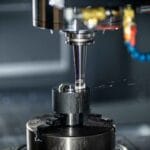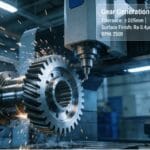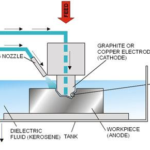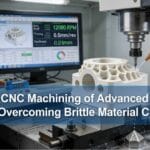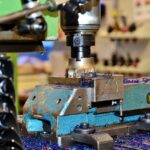
In the rapidly evolving world of manufacturing, fuel system components play a crucial role in ensuring the efficiency, reliability, and performance of engines across various industries, from automotive to aerospace. CNC (Computer Numerical Control) machining technology has revolutionized the production of these components by providing unparalleled precision, high repeatability, and the ability to work with a wide range of materials. This article explores how CNC machining technology enhances the production of fuel system components, focusing on the advanced techniques and technologies that optimize performance and precision, as well as the role of materials in fuel system manufacturing.
The Importance of Precision in Fuel System Components
Fuel system components are essential for the accurate delivery of fuel to engines, and even the smallest variation in their design or production can have significant consequences on performance and efficiency. These components, such as fuel injectors, pumps, regulators, and valves, must meet exacting specifications to ensure optimal fuel flow and combustion. The precision required in these parts makes CNC machining an ideal choice for their production. CNC machining enables manufacturers to achieve tight tolerances and surface finishes that manual machining simply cannot match, ensuring that fuel system components perform reliably under high stress and extreme conditions.
How CNC Machining Improves the Manufacturing of Fuel System Components
CNC machining technology offers several advantages in the production of fuel system components:
High Precision and Accuracy
CNC machines can process parts with extreme accuracy, achieving tolerances in the micrometer range. This is particularly critical when working with components that require precise fuel flow and pressure control. CNC technology can also consistently replicate parts, ensuring that each component is identical to the last. This high level of accuracy is crucial when manufacturing fuel system components, as even slight deviations can result in fuel inefficiency or failure of the engine.
Complex Geometries and Tight Tolerances
Fuel system components often feature complex geometries, such as tiny fuel injector nozzles or precisely drilled holes for fuel passage. CNC machines can easily handle these intricate designs, which would be nearly impossible to produce with traditional machining methods. The ability to achieve tight tolerances ensures that components fit together seamlessly, preventing leaks and enhancing the performance of the fuel system.
Customization and Flexibility
CNC machining is highly versatile and can be used to create custom designs for fuel system components. Whether it’s producing a one-off prototype or a batch of parts, CNC technology allows for quick adjustments to the design without significant downtime. This is particularly beneficial in industries like aerospace and automotive, where fuel systems must often be tailored to specific engine requirements or regulations.
Material Efficiency and Waste Reduction
CNC machining allows for the efficient use of raw materials, as the machines are designed to remove the least amount of material necessary to achieve the desired shape. This reduces waste and helps keep production costs lower, which is important when manufacturing high-performance fuel system components. The process also ensures that material properties are preserved, maximizing the strength and durability of the finished parts.
Role of Materials in Fuel System Components
The selection of materials for fuel system components is critical to ensuring their long-term performance and reliability. Fuel system parts must be resistant to corrosion, high temperatures, and wear while maintaining strength and flexibility. CNC machining technology offers the precision required to manufacture components from a wide range of materials, each selected based on its specific properties and intended use.
Types of Metals Used in Manufacturing Fuel System Components
When selecting materials for fuel system components, manufacturers must consider factors such as strength, thermal conductivity, resistance to corrosion, and machinability. Some of the most common metals used in the manufacturing of fuel system components include:
Stainless Steel: Known for its resistance to corrosion and high temperatures, stainless steel is a popular choice for fuel system components that will be exposed to harsh environments, such as fuel injectors and pumps.
Aluminum: Lightweight and resistant to corrosion, aluminum is often used in automotive fuel system components where weight reduction is a priority. Its good machinability makes it an excellent choice for CNC machining, allowing for precise, high-quality parts.
Titanium: Strong and lightweight, titanium is highly resistant to corrosion and can withstand extreme temperatures, making it ideal for aerospace fuel system components. Its strength-to-weight ratio is one of the highest of any metal, which is why it’s commonly used in high-performance applications.
Copper Alloys: Known for their excellent thermal and electrical conductivity, copper alloys are used in fuel system components such as fuel lines and regulators where heat dissipation is critical.
Each of these materials has unique properties that make them suitable for different applications within fuel system components. The selection of the right material ensures that the finished part will perform optimally under the specific conditions it will face in use.
Aluminum and Titanium in Precision Manufacturing
Both aluminum and titanium have use in precision manufacturing widely, especially in industries where performance and durability are paramount. The advanced capabilities of CNC machining technology allow manufacturers to take full advantage of the benefits these materials offer.
Aluminum in Precision Manufacturing: Aluminum is widely used in automotive and aerospace applications due to its light weight, ease of machining, and resistance to corrosion. CNC machining can achieve high tolerances and smooth surface finishes in aluminum, making it an ideal choice for fuel system components that require lightweight, strong, and precise parts. Aluminum’s thermal conductivity also helps manage heat dissipation, which is essential in fuel systems operating under varying temperatures.
Titanium in Precision Manufacturing: Titanium is often used in more demanding applications where strength, corrosion resistance, and the ability to withstand extreme conditions are required. Its high strength-to-weight ratio makes it ideal for aerospace fuel system components, where weight reduction is critical without sacrificing performance. Titanium’s resistance to corrosion and high temperature stability ensure that it performs well in harsh environments, such as those found in high-performance engines.
The Challenges of CNC Machining for Fuel System Components
While CNC machining offers many advantages in the production of fuel system components, it is not without its challenges. Some of the key challenges include:
Material Hardness and Tool Wear
Materials like titanium and hardened stainless steel can be difficult to machine due to their hardness. CNC machines must be equipped with specialized tools to handle these materials, and the process may require slower cutting speeds or additional cooling to prevent excessive tool wear and heat buildup.
Complex Part Design
The intricate geometries of fuel system components often require multiple machining operations to achieve the desired shape. This can increase production time and cost, as each operation requires careful planning and setup. The complexity of the design may also require specialized tooling or fixturing to hold the parts securely during machining.
Achieving Tight Tolerances
Fuel system components must be produced to extremely tight tolerances, which can be difficult to achieve with certain materials or machining processes. CNC machines must be calibrated and maintained regularly to ensure that they are capable of producing parts within the required specifications.
The Future of CNC Machining for Fuel System Components
As technology continues to advance, CNC machining for fuel system components is likely to become even more precise and efficient. The integration of automation, robotics, and AI-driven optimization is already helping manufacturers improve cycle times, reduce waste, and enhance part quality. With the ongoing development of new materials and machining techniques, CNC machining will continue to play a crucial role in enhancing the performance and reliability of fuel system components across industries.
Conclusion
CNC machining technology has transformed the production of fuel system components by offering unmatched precision, flexibility, and material efficiency. With its ability to produce intricate designs and tight tolerances, CNC machining ensures that fuel system components perform optimally, meeting the highest standards of quality and durability. By carefully selecting materials such as stainless steel, aluminum, and titanium, manufacturers can produce components that withstand extreme conditions while enhancing the performance of engines in various industries. As CNC machining technology continues to evolve, the future of fuel system component manufacturing looks brighter than ever.

